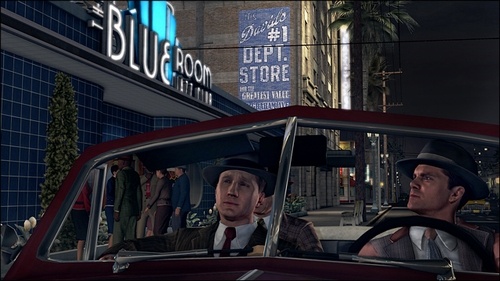
Reviewed: June 3, 2011
Reviewed by: Charles Boucher
Publisher
Rockstar Games
Developer
Team Bondi
 Released: May 17, 2011
Released: May 17, 2011
Genre: Action
Players: 1

 9
9
8
10
8
9.0
Supported Features:
Taking place in 1947 and following the exploits of former marine turned police officer Cole Smith, LA Noire sets in front of the player the task of investigating a series of crimes, ranging from missing persons cases and stolen vehicles to drug trafficking and serial murder. You’ll progress through five different roles in the police, ranging from being a beat cop to working the vice desk, with a different partner in each. Despite the variety in cases, however, the procedure is always largely the same. You drive to each crime scene (Or, more likely, have your partner drive – Driving yourself only risks damage to your car, the city, and its inhabitants, which penalizes you at mission end), search for clues by investigating every notable object (Most of which aren’t actually clues), and then interview anyone there. You follow leads, check up on suspects, and try to get the right man in the end.
To help make sure you stay on the right track, the game allows you the use of intuition points, which lets you eliminate a false choice during an interview, check on what most people from the Rockstar Social Club chose, or, perhaps most useful, highlight every clue at a crime scene. While intuition points come in handy, they’re in rather short supply. Frequent use will have you running dry most of the time, and based on your actual investigation skills. Interestingly, the game’s cases seem to have numerous branches depending on what you get right and wrong. If you don’t ace a case by the end, the game will have suggestions for what to change on your next play through, adding a surprising amount of replay value to an otherwise super-linear game.
While searching crime scenes can be a little bit tedious, often boiling down to bumping against the edges of rooms waiting for the controller vibration that indicates something to search, the interviews are where the game comes out ahead. L.A. Noire’s biggest claim to fame is the new facial animation technology, which comes across in the game. When you interview the child of a murder victim, the discomfort is plain in their face. When you’re dealing with a drug supplier whose position is protected by a deal with vice, he’s visibly smug. Liars will break eye contact, but so will people who’re uncomfortable being interviewed by the police. Being able to read the people you’re interviewing, and the situations they’re in, is tantamount to successful investigations, and the game manages to pull it off. The only downside is that the game’s animations are so lifelike on models that are only slightly above average that the game sometimes dips into the uncanny valley.
Though the gameplay falls into a few oft-repeated patterns, the game’s story is where it really shines. While at first it seems like the game is fully episodic, with each case being its own self-contained story, a trio of plotlines soon reveal themselves. While one is largely self-contained and wraps up quickly, the other two go on to intertwine and define the events later in the game. While you only see what happens during investigations, outside of occasional snippets of Phelps’ life outside of the line of duty and his time in the Marines, events happening alongside the plot are revealed by optional newspapers that play out their headline stories when found. It’s an interesting idea, but it can also mean losing a lot of context for events later in the game if you don’t collect every single paper along the way. If you get them all and pay attention, though, the plot threads tie together into one of the more satisfying, albeit darker, climaxes to a game in a long time, making the trip worthwhile.
Perhaps the largest issue the game has is its reluctance to abandon its sandbox roots entirely. When driving between cases, you get calls for street crimes, which often involve shootouts or foot chases, or one followed by the other. The shootouts are almost ridiculously simple for anyone who’s played a cover shooter before, boiling down to waiting for an opponent to step out of cover before popping out and taking a few quick shots to down them. Compared to the more restrained investigation of the main cases, Phelps racks up an alarming body count in the street crimes, becoming the 1940s west coast equivalent of Robocop, leaving a trail of dead crooks in his wake. It’s a strange departure from the tone of the rest of the game, and one I could have done without. The car chases, on the other hand, are generally simple compared to Grand Theft Auto’s fare, but also surprisingly satisfying, especially as they add other wrinkles into the late game, like trying to stop a runaway streetcar, or becoming the chased after a long game of doing the chasing.
Other sandbox elements include the collections, which are less of a gameplay element and more of a way to satisfy the obsessive-compulsive completionism that we’ve come to expect from open-world games. Between golden film reels, collecting cars, and finding LA landmarks, none of the collections are particularly engaging, even if they do allow players to better explore the amazingly well-rendered landscape of LA.
All in all, L.A. Noire wasn’t the kind of game I expected out of Rockstar, but it’s a bold step forward. While it has some issues to work out, and it could stand to leave some of its roots behind and come into its own, it’s a great game from beginning to end. We can only hope that as Rockstar pushes it forward as a franchise, they focus on the parts that made it good.




















